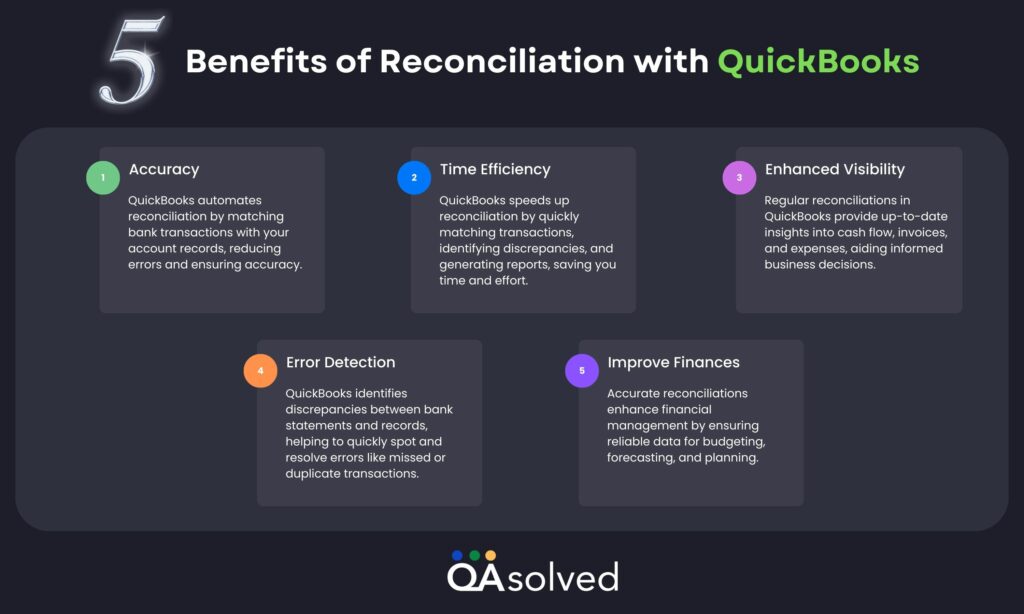Table of Contents
ToggleImagine a puzzle with missing clues or reading a book with missing pages. This is exactly what accounting looks like without reconciliation. Reconciliation paves the way to accounting, enabling it to reach a desirable conclusion. But the question is, What is account reconciliation? Account reconciliation simply means comparing and verifying transactions to meet accuracy. It often includes eliminating discrepancies to align your financial records with actual bank statements. When you do account reconciliation, it keeps your finances intact and organized. The ultimate aim is to synchronize the statements without any error to determine the accurate financial position of the organization.
Moving further in this blog, we will discuss the benefits of reconciliation in accounting but before that, let’s discuss the importance of the same.
Importance of Account Reconciliation
Reconciliation for accounting gives a boost to the financial health of any business. It is crucial to maintain accuracy and establish smooth functioning of the business affairs. It is usually done on regular intervals i.e. monthly or quarterly basis, as part of the accounting procedure. The below-mentioned points highlight the importance of reconciliation in accounting:
- Financial Accuracy: It identifies potential errors and rectifies them from financial statements.
- Detects Frauds: It unveils fraudulent transactions and warns you to take appropriate action.
- Cash Flow Management: It keeps track of cash in-flow and out-flow to effectively facilitate financial planning.
- Tax Compliances: It keeps your business affairs adhering to tax compliances and regulatory norms.
- Risk Mitigation: It identifies errors and discrepancies at an earlier stage to mitigate risk and avoid significant losses.
- Decision-Making: It supports informed decision-making for businesses by providing reliable and accurate information.
- Customer-Vendor Relationship: Accurate billing payments foster trust and storage keep a track record for future reference.
The above-mentioned pointers show the significance of account reconciliation and it is clear that a regular reconciliation process is required to maintain the financial stability of any organization. Today, many small and mid-sized companies are using QuickBooks to not only streamline their finances but to also ensure a seamless integration and achieve unparalleled excellence and accuracy while maintaining their books. Moving ahead, we will understand why QuickBooks is an ideal platform for growing enterprises to simplify and automate their bookkeeping and accounting tasks.
Mistakes to Avoid while Bookkeeping
Mistakes in bookkeeping and accounting may lead to serious repercussions. This can directly create a negative impact on the overall growth of your business. Here are the 5 common mistakes that any bookkeeper or accountant can make and should be vigilant about avoiding.
- Transactions Omission
One can easily forget to record a transaction in their QuickBooks software or in a bank statement and this may lead to an unmatched balance. To avoid such an error, reviewing and matching entries regularly in both QuickBooks and bank statements is important.
- Typo Error
Typo error is one of the most common errors that often lead to mismatches in your books. QuickBooks import feature allows you to enter data manually so that you don’t have to reconcile your accounts too frequently.
- Duplicate Transaction
Recording the same transaction more than once may lead to duplicacy. To eradicate this issue, one needs to keep a check on their transactions by reviewing the entries regularly to remove any redundancy.
- Irregular Monitoring
Irregular monitoring can cause errors making it more difficult to resolve. Reconcile your account monthly or quarterly to quickly identify and correct issues.
- Incorrect Opening Balance
This is due to the inaccuracy or failure in the previous reconciliation process. Make sure that the closing balance of your previous reconciliation matches with the opening balance of the current period.
So, these are the five common mistakes that can be avoided to ensure that your books are maintained properly. If you’re facing any problem with the same, then we would suggest you to connect with our QuickBooks support team for top-notch services regarding any error or issue.
Why is QuickBooks an Ideal Solution for Growing Enterprises?
As enterprises grow, the complexities rise. They often look for smart solutions to ensure the best management of their finances. This is where QuickBooks enters the equation and starts to play a significant role for business enterprises. QuickBooks sets different standards to level up your business by simplifying account reconciliation through automation, providing valuable hands-on insights and real-time tracking of your accounting information. This not only streamlines your finances but also saves valuable time allowing you to focus on other business activities and strategies.
QuickBooks, with its robust features and scalability, navigates entrepreneurs to fulfill their financial needs and offers a compelling solution to grow their business. Thus, by leveraging its use case for your business, you can maintain and streamline your financial activities.

Conclusion
Account reconciliation is a broader yet the most effective process of accounting which helps to minimize the scope of errors and confusion. Effective reconciliation is pivotal for ensuring stability and maintaining the financial health of an organization. QuickBooks emerges as an ideal solution as it sets a benchmark that gives a new definition to your business operations. It is a unique accounting software that empowers small and mid-sized businesses to achieve their financial goals.
QuickBooks proves to be your best financial partner that supports integration to achieve your financial goals. In conclusion, QuickBooks offers more suitability to your business. If you need any further assistance regarding reconciliation or any other accounting solution, feel free to connect with our dedicated experts at +1-855-875-1223.
Frequently Asked Questions
Reconciliation is crucial as it ensures accuracy, reliability, and error detection in the financial records by verifying transactions.
It depends on the organization’s size and dealings but should be done at regular intervals like monthly or quarterly to ensure the preciseness in the financial statements.
QuickBooks simplifies reconciliation for accounting through automation, its accuracy, efficiency, and reliability for further accounting usage.
It’s a powerful tool that offers accuracy, significantly manages your cash flow, fraud detection, enhanced financial reporting, and streamlined overall financial processes.
QuickBooks is highly advanced and integrated accounting-based solution software specially designed for small and medium-sized businesses to simplify their routine tasks.


